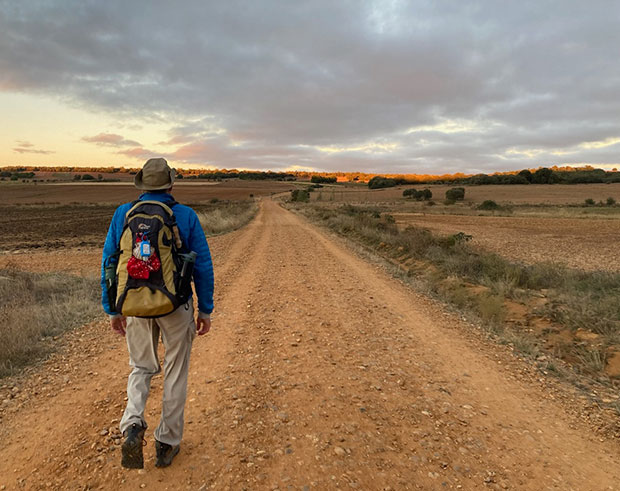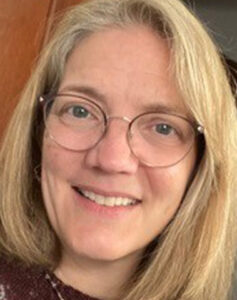
Tom Novak, a member of St. Thomas More Parish-Coralville and Camino de Santiago pilgrim, walks the meseta, a vast plateau in the center of Northern Spain, in September 2024.
By Kim Novak
Guest Column
(Editor’s note: Kim Novak, a member of St. Thomas More Parish in Coralville, made a pilgrimage on the Camino de Santiago in fall 2024 with her husband, Tom. They walked for 35 days over 550 miles across Spain. This is the first in her three-part reflection.)
“How are your feet today?”
“What are you doing for those blisters?”
“Where are you stopping this evening?”

The questions of fellow pilgrims along the Camino de Santiago were about the immediacy of the moment. The now. In some tender way, these questions came to convey sentiments of “I’m walking right here beside you. Your worries of the day are my worries; your pain is my pain.”
One question landed in a way that was so personal and occasionally so elusive: “What brought you here?” For some, the reason was a defined searching as they sat in a liminal space. Losing a job, a spouse, retiring, looking for their next move. For others, the journey was for adventure or health. There were as many unique responses, paths and experiences as there were pilgrims. The Way is many ways.
As Tom and I began our pilgrimage on the Camino de Santiago, a thousand-year-old, 520-mile walk across Spain, my head and heart were foggy. Why this journey, this place, this time? I was at a loss to name or describe what called me. In Paris, I wrote in my journal asking God to help me live the questions as we embarked on this six-week journey. As I pondered the questions along The Way, I came to understand that finding answers was not the point of this journey or of life. Like Jesus’ time in the desert, this time was about hearing, seeing and walking with the Divine. It was about squarely facing the woundedness and temptations in myself and allowing and witnessing transformation and growth. It was about finding the Divine in the pilgrim beside me and the world around me.
What we carry
Pilgrimage starts well before the backpack is strapped and the first step is taken. We pack intentionally and what we carry says just a little bit about each of us: the young man who carries nothing but a daypack, the woman whose pack is bigger than her body, the middle-aged couple whose full suitcases are transported ahead each day. We tuck into these bags a few of our fears, insecurities and hopes and our needs for adventure, comfort and distraction.
By day four, the weight of our packs was just heavy enough, the day’s walk just long enough, that blisters appeared, reminding us of the fears we carried. Fear that we might not find food; fear that our hostel may not provide what we need; fear that we may not have “enough” or that we may not be safe. There was a gift in those blisters. We needed to look at our fears squarely; by day eight, we had to ask for help. We went through our bags eliminating the “just in case” items —extra clothes and gadgets — and gave them away. We limited the food we hauled, trusting that tortillas and croissants would be available in the next town. We reminded ourselves of the many fellow pilgrims we could lean on. In what felt like a bit of a defeat, we had a transport company carry one of our bags each day to take some weight off our very sore feet.
One of the sayings repeated on this pilgrimage is, “The Camino provides.” How do we learn to trust? We had not trusted that a place for rest would be available over the next pass and a bed at the end of the day or that food would be plentiful if we could wait another half-hour. We were not trusting in the help and compassion of others, trying instead to be self-reliant. Thom Rutledge, a therapist and author asks, “How might I be different if this fear did not live inside my chest?” As I pondered this, I prayed: “The Camino provides, The Way provides, YHWH provides.” I wandered back to a psalm that has carried me in difficult times, “When anxiety and worries are many, your consolation brings joy to my soul” (Ps. 94:19). There is so much joy in the journey when we can release what we carry, living in the full knowledge that The Way provides.
(Kim Novak is completing training as a spiritual director through the Franciscan Spirituality Center in LaCrosse, Wisconsin. Contact her at kimberly.a.novak914@gmail.com)








